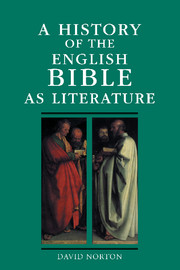Book contents
- Frontmatter
- Contents
- List of plates
- Preface
- List of abbreviations
- 1 Creators of English
- 2 From the Great Bible to the Rheims-Douai Bible: arguments about language
- 3 The King James Bible
- 4 Literary implications of Bible presentation
- 5 The struggle for acceptance
- 6 The Psalter in verse and poetry
- 7 ‘The eloquentest books in the world’
- 8 Writers and the Bible 1: Milton and Bunyan
- 9 The early eighteenth century and the King James Bible
- 10 Mid-century
- 11 The critical rise of the King James Bible
- 12 Writers and the Bible 2: the Romantics
- 13 Literary discussion to mid-Victorian times
- 14 The Revised Version
- 15 ‘The Bible as literature’
- 16 The later reputation of the King James Bible
- 17 The New English Bible
- Bibliography
- General Index
- Biblical Index
5 - The struggle for acceptance
Published online by Cambridge University Press: 05 June 2012
- Frontmatter
- Contents
- List of plates
- Preface
- List of abbreviations
- 1 Creators of English
- 2 From the Great Bible to the Rheims-Douai Bible: arguments about language
- 3 The King James Bible
- 4 Literary implications of Bible presentation
- 5 The struggle for acceptance
- 6 The Psalter in verse and poetry
- 7 ‘The eloquentest books in the world’
- 8 Writers and the Bible 1: Milton and Bunyan
- 9 The early eighteenth century and the King James Bible
- 10 Mid-century
- 11 The critical rise of the King James Bible
- 12 Writers and the Bible 2: the Romantics
- 13 Literary discussion to mid-Victorian times
- 14 The Revised Version
- 15 ‘The Bible as literature’
- 16 The later reputation of the King James Bible
- 17 The New English Bible
- Bibliography
- General Index
- Biblical Index
Summary
THE DEFEAT OF THE GENEVA BIBLE
Sir Arthur Quiller-Couch, lecturing at Cambridge during the First World War, asked his audience to assent with him ‘that the Authorised Version of the Holy Bible is, as a literary achievement, one of the greatest in our language; nay, with the possible exception of the complete works of Shakespeare, the very greatest’. He was confident of agreement – ‘you will certainly not deny this’ – for he was enunciating a generally-held belief. The English Bible, embodiment of the world's greatest collection of literature, matched the originals for quality of language, even if it did not convey their truth with the utmost accuracy; it was the creation of masters of the English language whose work was perfected through the artistry of the King James translators; such was its quality of language that it was instantly acclaimed and given due supremacy over all other versions.
A present-day reader might well assent to the literary judgement, but the historical aspect is a myth. However fine the English of the translators from Tyndale on now seems, no one in their time appreciated it. It was all too obviously poor, if it was worth considering at all. And that was the way it continued to appear to most people until well into the eighteenth century. Must one therefore conclude that the English Bible was the proverbial pearl cast before swine? And that the swine at some point in the eighteenth century received an illumination, that they were suddenly dazzled by the pearl? Or is the truth that the English Bible was less of a pearl and the English people of the sixteenth and seventeenth centuries much less swine-like than they might seem?
- Type
- Chapter
- Information
- A History of the English Bible as Literature , pp. 89 - 114Publisher: Cambridge University PressPrint publication year: 2000

